A unified Sudanese government with a popular mandate would be better able to forge a sustainable peace with Israel, write Payton Knopf and Jeffrey Feltman, whereas a rushed Israeli-Sudanese agreement could unravel Sudan’s transition. This piece was originally published by the United States Institute of Peace.
With the United Arab Emirates (UAE) and Bahrain having joined Egypt and Jordan in declaring peace with Israel, those asking “who’s next?” often look enthusiastically westward, toward Khartoum. Adding new chapters to the Abraham Accords is in the U.S. interest, but so is a successful transition in Sudan. And the sequence of these steps is critical. A unified Sudanese government with a popular mandate will be better able to forge a warm and sustainable peace with Israel, whereas a rushed Israeli-Sudanese agreement has the potential to unravel Sudan’s transition and generate renewed support for Sudan’s Islamists and their foreign backers.
The appeal of Sudan, once firmly in the grip of Islamists and still on the U.S. list of state-sponsors of terrorism, appearing on a positive peace ledger is obvious. Following the announcement of the Abraham Accords between Israel and the UAE, there has been a flurry of conjecture around which Arab countries might normalize their own relations with Israel—and of diplomatic activity to induce and incentivize such a move. Secretary of State Mike Pompeo’s visit to Khartoum on August 25 and a subsequent trip to Abu Dhabi by the chairman of Sudan’s Sovereign Council, Gen. Abdel Fattah al-Burhan, on September 20 have continued to fuel speculation.
Building on Shaky Ground: Sudan’s Fragile Transition
Unfortunately, much of the debate around the prospects for an improvement in the Israel-Sudan bilateral relationship has ignored the fragility of Sudan’s political transition and the risks that premature normalization could pose for the strategic interests of the United States, Israel, and the UAE. No one wants a repetition of the 1983 Israeli-Lebanese peace agreement, which, signed by a Lebanese government without popular legitimacy, collapsed in less than a year.
Five months after President Omar al-Bashir was deposed in 2019 following a 30-year dictatorship, an agreement on a transitional government was reached between the military junta that deposed him and the civilian protest movement that precipitated his downfall. This transition was predicated on a delicate cohabitation arrangement between military and civilian stakeholders, with the Sovereign Council, chaired by al-Burhan; the cabinet, led by a technocratic prime minister in Abdallah Hamdok; and a legislative assembly—with each having a delineated set of responsibilities until elections in 2022.
Despite the brutality of the Bashir regime, Sudanese civil society, including trade unions and professional associations, remained remarkably active. Sudan’s political landscape was one of the most diverse and vibrant in the Arab world, with organized forces ranging from communists and Baathists to liberal secular forces to a range of Islamist-oriented groups. Many of these aligned in opposition to Bashir but differed in their vision for what should follow him. The transitional arrangement was therefore designed to balance these myriad constituencies during the development of a new constitutional order, prevent the country’s fragmentation and a descent into civil war, and provide a pathway toward democracy that met the aspirations of the hundreds of thousands of Sudanese, predominately youth, who had demonstrated en masse for five months in an historic and nonviolent revolution.
Bashir had been adept at navigating among rivalrous Middle Eastern powers, demurring, for example, in choosing sides in the GCC crisis. And not surprisingly, Saudi Arabia, the UAE, Qatar, and Turkey all sought to influence the post-Bashir dispensation. In particular, the perception of Saudi and Emirati backing for the military junta against civilian, democratic forces led to a public backlash within Sudan. Qatar and Turkey were less overt in their support for particular individuals or factions, though Ankara gave refuge to a number of senior figures from Bashir’s regime.
Unfortunately, one year into the transition, the security and economic crises that were the proximate trigger of the anti-Bashir demonstrations have worsened. Millions remain displaced. The value of the Sudanese pound has plummeted from 45 to a U.S. dollar in August 2019 to nearly 300 this month. More than half of the country is severely food insecure. And despite pledges of support, the international community has failed to mobilize resources commensurate with the historic opportunity of the transition. Public disaffection with the transitional government has increased, and divisions not only between security and civilian actors, but within them, have widened.
Any steps toward a normalization of relations between Israel and Sudan must first and foremost be considered in this context. To do otherwise risks further fracturing the transition and the integrity of the state itself.
Sudan’s Revolution and the Legitimacy of the Transition
One of the most significant ambiguities in the Constitutional Declaration that established the transitional government was whether the Sovereign Council, the cabinet, or the legislative assembly holds primary responsibility for foreign policy. Following Secretary Pompeo’s visit to Khartoum, Prime Minister Hamdok asserted that the government did not have a mandate to make such a significant decision, while Burhan allegedly expressed more openness. The legislative assembly, which is ostensibly empowered to set the political direction of the transition, has not yet been established.
Sudan’s revolution was animated by a widespread aspiration among Sudanese to have a say in their own governance, and the relationship with Israel remains a controversial issue. Burhan’s meeting with Israeli Prime Minister Netanyahu in Uganda in January, for example, sent shockwaves throughout the country—not just among Islamists, but among many of the liberal and secular forces that were on the vanguard of the revolution and are committed to pluralism. A decision on normalization cannot be both historic and inconsequential. For a caretaker government—or a set of individuals within it—to make a unilateral decision would mean the move lacks the legitimacy, and therefore the durability and sustainability, that the legislative assembly or an elected government could give it.
Press reports have indicated that the United States would de-list Sudan from the state-sponsors of terror list and, with Emirati support, provide several billion dollars of aid in exchange for normalization. However, if normalization is seen as resulting from exploitation of Sudan’s economic and humanitarian desperation, it will be even more polarizing among the public, accelerate the erosion of support for the transition, and expose the prime minister to the machinations of those within Sudan who are opposed to reform and, ironically, to the very regional actors that Israel and the UAE view as their primary adversaries.
Sudan’s transition presents a once-in-a-generation opportunity for the country to chart a path out of autocracy and violence toward democracy and stability, which would send positive ripples throughout the long-volatile region. That transition cannot succeed, however, if the country becomes enmeshed in regional rivalries. Libya should serve as a cautionary tale in that regard. Given that Sudan’s population is nearly six times that of Libya’s, however, state breakdown would be even more catastrophic—not just for its own citizens, but for the interests of the United States and its allies and partners in Europe and the Middle East. Washington’s first priority should be a successful transition in Sudan and the creation of a unified government with popular legitimacy that’s able to make the type of historic decision that an Israeli-Sudanese peace agreement would be.
The Brookings Institution is committed to quality, independence, and impact.
We are supported by a diverse array of funders. In line with our values and policies, each Brookings publication represents the sole views of its author(s).

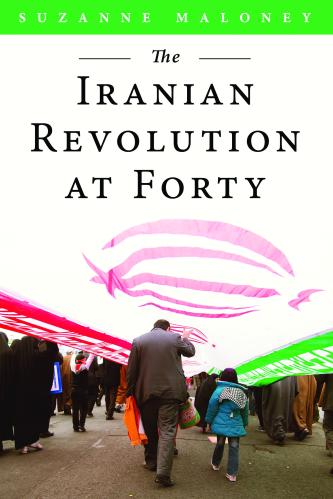
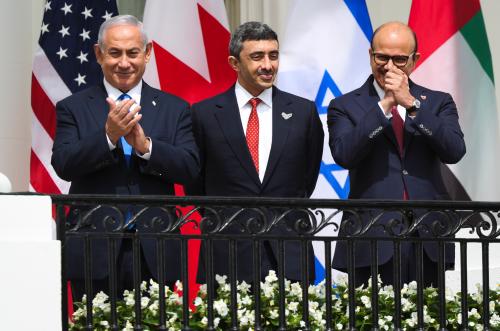
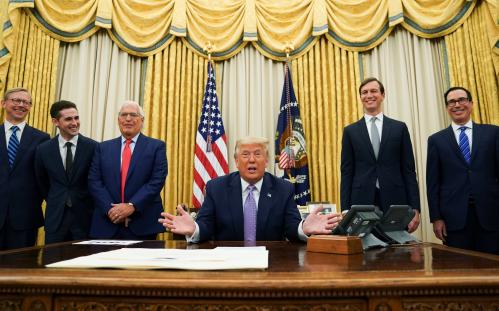


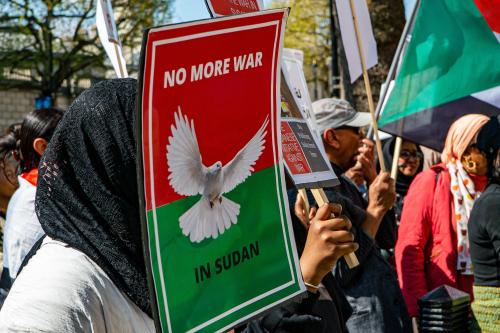
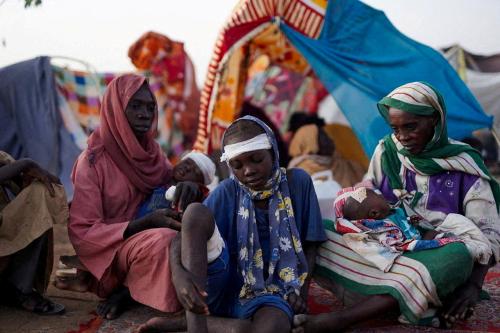

Commentary
Normalizing Sudan-Israel relations now is a dangerous game
September 24, 2020